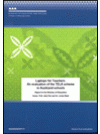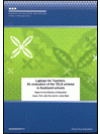The purpose of this evaluation is to investigate the impacts of the Laptops for Teachers Scheme: TELA (referred to from here as the TELA scheme) on teachers’ work over a period of three years (2006, 2007, 2008) and to record emerging changes in laptop use. This evaluation report presents findings from the three annual cycles of national focus groups and questionnaires with Years 1 to 3 teachers in New Zealand primary schools.
In this evaluation, two methods of data collection were used: first, three focus groups were held with teachers in face-to-face meetings and second, a questionnaire was sent to teachers in a range of schools. The focus groups allowed teachers to talk about changes in their use of the laptop over the three years. Focus groups were held in the Taranaki, Wellington and Marlborough areas. The questionnaire asked teachers about various aspects of their laptops experience, including school support for laptops, professional development, their use of laptops at home and in school, and their goals for future use. In this final report, questionnaire results are presented together with the results from the focus groups held over three years.
Key Results
Teachers’ perceptions changed over the three-year period from thinking of the laptop as an extra computer in the classroom or as a teacher’s administrative tool, to seeing the laptop as a way of increasing student motivation and engagement, and provided students with another way to learn.
The evidence in this report demonstrates that the implementation of the Laptops for Teachers scheme has resulted in progress towards the achievement of goals for this initiative. It indicates:
- Increasing confidence and expertise with ICT for many teachers
- Growing use of laptops for classroom practice and student learning activities
- Increasing use of laptops to strengthen communication and collaboration
- Efficiencies gained in lesson planning, preparation, administration and reporting.
- Improved teacher confidence and expertise with ICT
Overall, there was a shift towards greater confidence over the three-year period. An increasing proportion of expert users felt more comfortable creating a database, downloading digital photos, and using presentation software. Intermediate users felt more comfortable sending emails, using graphics, downloading digital photos, using presentation software, locating online information in a database, and creating a database. Beginners had gained confidence in searching the Internet and locating online information in a database.
- Growing use of laptop for classroom practice and student learning activities
Between two-thirds and three-quarters of teachers were using their laptops with their students by 2008 (up from 50% in 2006). This use was with individuals (63%), small groups (67%) and more often with the whole class (78%), and most of this use was ‘occasional’.
Laptop access to the Internet during lessons had grown over the three-year period from a half to two-thirds of teachers (2006–48%: 2007–62%: 2008–67%). The use of the laptop to individualise learning and to engage children in interactives had grown from a third to nearly two thirds of teachers reporting this use (2006–35%: 2007–54%: 2008–60%). There had also been an increase in laptop use with a data projector from 31% to 54% of teachers.
There was evidence to suggest that teachers were using their laptops to allow students to encounter learning in a variety of ways and through different tasks and contexts. Examples of laptop use within curriculum areas were given by 72% of teachers responding to the questionnaire in 2008. The laptop was used to connect to the Internet to extend the learning beyond the classroom and to allow students to make connections with other students around the world. Used with software, the laptop became a way to provide students multiple ways of learning and helped them to take charge of their own learning. Teachers made resources using the laptop and adapted them to be relevant to their students. The laptop enabled teachers to manipulate visual images from a variety of sources to motivate and inspire children who were learning to read and write. Teachers were finding themselves more often in the role of facilitator of learning, encouraging children to think creatively and to make connections between their learning. Teachers modelled tasks for students using the laptop, helping to make the learning process transparent. The laptop was found to be useful to enhance learning that had first been encountered outside the classroom. There were examples of teaching using the laptop that created a supportive learning environment for the students to undertake inquiry and to be active members of the learning community in their classrooms.
There was a growing demand for professional learning opportunities to help teachers to make use of the laptop for teaching and learning – in 2008, 57% of teachers reported this as the area of development they would prefer (2006–43%: 2007–52%).
- Increasing use of laptops to strengthen communication and collaboration
There was a growing proportion of teachers who made some use of their laptops to communicate with colleagues within the school (2006-70%: 2007-76%: 2008-82%), and to contact students via email (2006–9%: 2007–13%: 2008–17%). The use of the laptop to email colleagues outside the school (up to 77% from 57%), and to communicate with parents via email (up to 49% from 32%), had increased over the three-year period. There was also increased use of laptops for each of the three collaborative tasks – participating in online discussions, accessing the Internet for professional readings, and the collaborative development of materials. This had the effect of an increased proportion of teachers making some use of the laptop for collaboration, particularly for the participation in online discussion lists or forums (2006-19%: 2007-28%: 2008-31%).
- Effectiveness in lesson planning and preparation, and administration
By 2008, over three-quarters of teachers were routinely using laptops with planning templates, and to prepare student handouts. Around two-thirds were routinely adapting worksheets for students and accessing Internet information for lessons. The biggest increases in routine use were checking schemes and units (from 44% in 2006, to 55% in 2008) and combining use with other equipment (from 28% in 2006 to 38% in 2008). By 2008, nearly all teachers used their laptops for administrative tasks to do with student data management and reporting, and around three-quarters of teachers used their laptops to check notices and take notes at meetings.
Implications from the findings
The evaluation indicated that school and teacher use of TELA laptops is shaped by the intersection of school and individual teacher vision for, and expertise in, the use of ICT, school technological infrastructure, school leadership and systems for ICT use, and teacher opportunities for learning. Each of these aspects is important in different ways for different schools, however, evidence of the collaborative nature of teaching in the junior school was particularly striking and leads to our recommendation that a collaborative approach to teacher development within schools and in local school communities, supported by the allocation of resources at a policy level, is required to encourage and sustain the integration of the laptops into teachers’ work.
Recommendations for policy support of change and sustainability
Support for teacher development and the use of laptops for teaching and learning
- Schools would benefit from continued support in the form of upgraded laptops, reasonable prices for peripherals and ICT technical support, advice and guidance to assist teachers and schools to continue and extend their use of the laptop as an administrative, collaborative and teaching tool.
- Continue support for schools to be involved in cluster groups to share ideas and expertise.
- Research be undertaken into the use of laptop-plus-interactive whiteboard, the Internet and other peripherals at the junior levels.
- Research be undertaken into the nature of peer mentoring at the junior level.
- Research be undertaken into the impact of effective leadership on laptop use.
School leadership
- School leaders be given opportunities to learn about possibilities for ICT use across school management and administration, and for teaching and learning, so they can set expectations for teacher laptop use.
Support for school technological infrastructure development
- School technological infrastructure improvement programmes be seen as ongoing, as teachers are keen to take advantage of new technologies as they are developed.
- Consideration be given to funding onsite school technical support positions.
Alignment with other policy initiatives
- Other policy initiatives include consideration of the role of teacher laptop/ICT use as a means of professional development and for efficiencies.
- Research be undertaken into the combined impacts of different policies on laptop use.
Recommendations for schools
Professional learning opportunities
- Take advantage of opportunities to be involved in cluster groups to share ideas and expertise.
- The introduction of strategies to allow additional ‘time’ to experiment with laptop capabilities and practice with use for teaching would be most beneficial to teachers.
- The focus for future professional development be on how teachers might use the laptop for teaching and learning.
- Consideration be given to how to optimise peer mentoring opportunities to provide for professional learning that is relevant, timely and supportive.
School leadership
- School leaders be encouraged to set expectations for laptop use and provide time and support for teachers to be able to meet these expectations.
- Where practical and appropriate, school leaders model use of laptop/ICT for administrative and management tasks, and for communication.
Support for school technological infrastructure development
- Schools need to budget for ongoing ICT development, maintenance and purchasing of peripherals.
- Schools be encouraged to provide off-site access to school networks to enable teachers to carry out administration, preparation and planning tasks using their laptops at home.
Recommendations for teachers
Professional development: developing and supporting a community of learners
- Teachers take advantage of what opportunities they have to access professional development on the potential of ICT at local, cluster and national forums.
- Peers are the most accessible source of professional development. Teachers would be advised to seek out help from, and share ideas with, colleagues, particularly those in the same syndicate.


